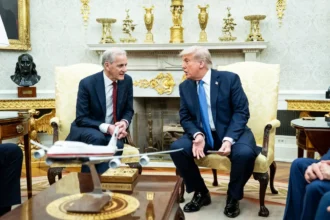In a massive move geared toward lowering transatlantic trade tensions, the European Union has introduced the suspension of retaliatory price lists on more than a few United States Items. The decision marks a leap forward in efforts to normalize financial family members among the two longstanding allies after years of tariff disputes.
Background of the Tariff Conflict
The dispute dates back to the Trump administration, when the US imposed price lists on European metal and aluminum imports, citing countrywide protection worries.The measures escalated trade tensions and threatened bitter diplomatic ties.
Although the Biden administration has taken steps to rebuild alliances and shift far from aggressive exchange measures, a few tariffs remained in the area prompting extended negotiations between Washington and Brussels.
Temporary Suspension to Pave the Way for Resolution
The suspension goals to create an extra constructive environment for ongoing talks with the United States
This is a display of goodwill. We are hopeful that this pause will cause an everlasting decision that benefits each facet,” Dombrovskis stated at a press conference in Brussels.
The EU’s flow has been welcomed by way of the United States Administration, which defined the selection as “an vital step closer to resolving longstanding trade variations.” United States.
Impact on Industries
Several American industries that had been suffering from the retaliatory price lists have expressed alleviation. The United States Whiskey industry, which suffered a steep decline in exports to Europe because of extended prices, replied undoubtedly.
- Similarly, American motorbike producers and denim exporters see the suspension as a turning point in regaining lost European marketplace proportion.
- European Concerns Also Addressed
- From the European side, officers are positive that the suspension may also inspire the United States To lift its price lists on EU metal and aluminum. The European metallic enterprise has faced great demanding situations due to the continuing restrictions, and there is mounting strain within the EU to reach a balanced deal.
German Chancellor Olaf Scholz said, “This suspension brings us toward a sustainable change partnership. We urge our American companions to not forget a complete rollback of the metallic and aluminum price lists in the spirit of cooperation.”
Analysts Weigh In
Trade analysts see the EU’s decision as a strategic circulate that gives each party time to reset and realign their change policies.
“Suspending the price lists does not stop the dispute, however it indicates a mutual willingness to repair economic ties,” said Emily Stafford, an exchange expert on the Atlantic Policy Center. “This also sends a message to international markets that the EU and United States are dedicated to collaboration rather than warfare.”
Next Steps
Negotiations are predicted to hold over the approaching months, with running organizations from each facet set to cope with precise trade worries, such as subsidies, price lists, and requirements. There is cautious optimism that a greater everlasting settlement may be reached before the suspension duration ends.
The EU has emphasized that at the same time as its miles pausing the retaliatory measures, it reserves the proper to reinstate them if development stalls or if the United States Takes similarly unilateral exchange actions.
FAQs
Q: Which merchandise were tormented by the EU’s retaliatory price lists?
A: American exports together with whiskey, bikes, peanut butter, jeans, and positive agricultural goods have been centered.
Q: Are the United States Price lists on EU metal and aluminum still in the area?
A: Yes, however discussions are ongoing, and the EU is urging the United States
Q: How lengthy will the suspension be?
A: The EU has suspended the price lists for 6 months, with the choice to increase or reinstate them primarily based mostly on improvement.
Q: Why did the EU make this pass now?
A: The EU desires to ease tensions, promote cooperation, and provide negotiations as a threat to remedy exchange disputes.
Conclusion
The suspension of retaliatory price lists marks a turning point in United States-EU alternate family members. While challenges remain, this diplomatic gesture underscores the shared hobby in restoring consideration, promoting growth, and stopping future monetary confrontations. With each facet now seated on the negotiating desk, there’s renewed hope for a long-time period resolution that helps industries and clients on both continents.



